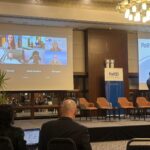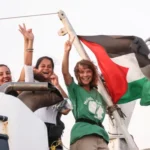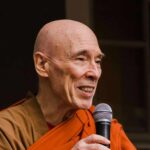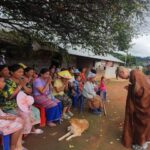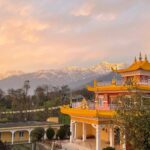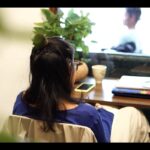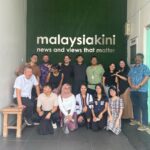Ecological Week
Mon stated the Ecological week talking about how removed humans had become from Nature?s beautiful, natural cycle, and the need to close the loop between consumer, producer, production, consumption and disposal. The massive hidden costs of our consumer culture is pulling the fabric of our Natural world apart and exploiting anyone and anything that gets in the way.
Witoon Permpongsacharoen, Director of the Mekong Energy and Ecology Network, and long time activist for the protection of the Mekong River basin, came to talk about the huge impact large scale hydroelectric damming is having on this intricate and diverse ecosystem. Spanning 4 countries, the roots and impacts of damming projects across Mekong region was hugely enlightening. The sad stories of loss of habitat, local livelihoods, blocked fish migration routes and salt intrusion into Vietnam?s river delta, touched hearts; the statistics of rural destruction for electrical gain ? for cities like Bangkok – are staggering. Do we NEED more air conditioned, brightly lit shopping Malls? Who gains by this madness?
How to balance humans needs and the wants – the participants discussed appropriate technologies and how they try to address this in a social, environmental and economically sensitive way in their own communities. They discussed how in some places these technologies work, like windmills in the North Sea, and where others are not as successful, like bio-mass plants in India which use the fodder for the animals and are so large the fuel has to be transported from far around to supply it. Small scale hydroelectric generators struck some participants as a very viable option in the right location.
 Paola?s presentation on green building design, showing solutions to challenges and including some beautiful homes from around the world, uplifted spirits. The presentation ended the power of the Peace Building project from Scotland and many of the participants were inspired by the graceful reciprocal roof design.
Paola?s presentation on green building design, showing solutions to challenges and including some beautiful homes from around the world, uplifted spirits. The presentation ended the power of the Peace Building project from Scotland and many of the participants were inspired by the graceful reciprocal roof design.
The EDE venue then shifted to the amazing Ashram of Energy where the participants learnt how to make charcoal, use the wood vinegar by-product in organic fertilisers and the creation of bio-diesel. The Ashram of Energy was a good example of a closed loop system, centred around the creation of charcoal and using it and its by-products from cooking to farming. The Ashram grows 90% of their own food and supplied the participants with their first hot shower in weeks – through solar heat and electricity. Participants were also treated to a natural Thai spa where they sat outside beneath shaded trees, wearing tamarind masks of their own creation, and later shifted to a mud-house sauna. The compact Ashram of Energy community, nestled amongst forest and rugged mountain peaks, was living example of closed loop natural systems and community outreach, giving participants a good insight into sustainable living, Southern style.


